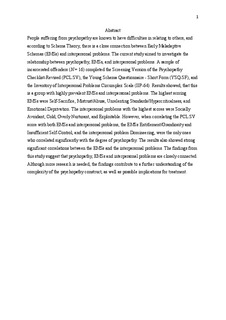| dc.description.abstract | People suffering from psychopathy are known to have difficulties in relating to others, and
according to Schema Theory, there is a close connection between Early Maladaptive
Schemas (EMSs) and interpersonal problems. The current study aimed to investigate the
relationship between psychopathy, EMSs, and interpersonal problems. A sample of
incarcerated offenders (N = 16) completed the Screening Version of the Psychopathy
Checklist-Revised (PCL:SV), the Young Schema Questionnaire - Short Form (YSQ-SF), and the Inventory of Interpersonal Problems Circumplex Scale (IIP-64). Results showed, that this is a group with highly prevalent EMSs and interpersonal problems. The highest scoring EMSs were Self-Sacrifice, Mistrust/Abuse, Unrelenting Standards/Hypercriticalness, and Emotional Deprivation. The interpersonal problems with the highest scores were Socially Avoidant, Cold, Overly Nurturant, and Exploitable. However, when correlating the PCL:SV score with both EMSs and interpersonal problems, the EMSs Entitlement/Grandiosity and Insufficient Self-Control, and the interpersonal problem Domineering, were the only ones who correlated significantly with the degree of psychopathy. The results also showed strong significant correlations between the EMSs and the interpersonal problems. The findings from this study suggest that psychopathy, EMSs and interpersonal problems are closely connected.
Although more research is needed, the findings contribute to a further understanding of the complexity of the psychopathy construct, as well as possible implications for treatment. | nb_NO |
